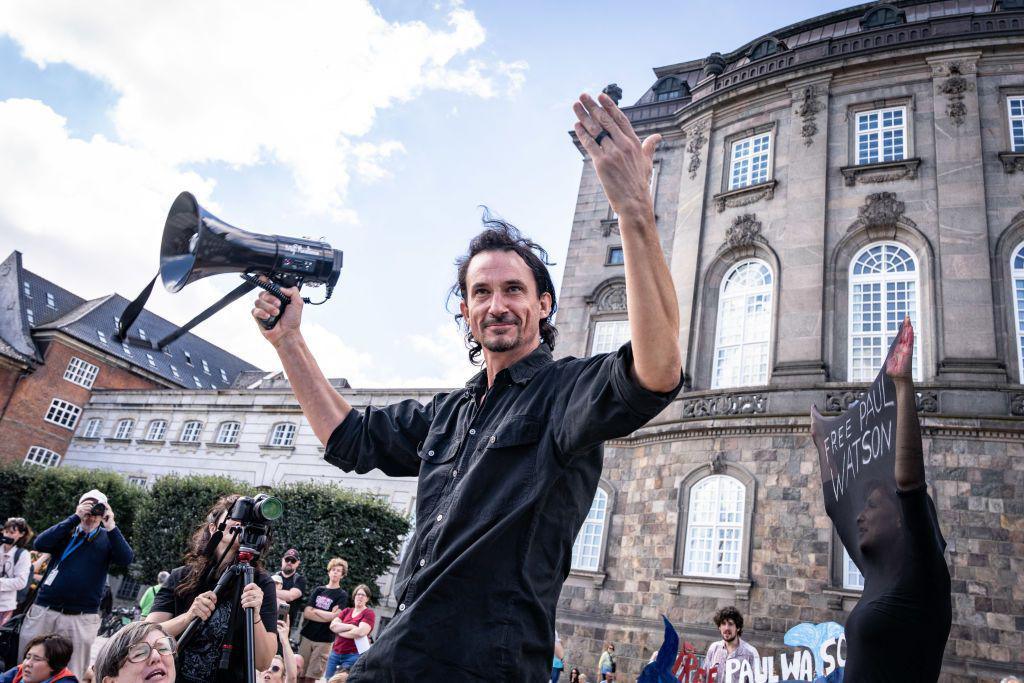Could metal music help to save the planet?

Birmingham band Napalm Death are among metal pioneers credited with inspiring a global response by environmental activists
- Published
Could modern global environmental activism have roots in the industrial heartland of 1970s Birmingham? As experts and artists gather to discuss the legacy of Black Sabbath, as well as the band's late singer Ozzy Osbourne, one academic claims it could be the case.
A "neglected, but crucial" aspect of Black Sabbath's legacy is their influence on environmental activism within metal music, says Dr David Gange.
Their non-conformist ways, some band members' commitment to veganism and "prescient environmentalist anthem" Into the Void, have inspired generations, he said.
The University of Birmingham associate professor is set to present his findings on the "ecometal" scene at an event in the city.

Unearthly Rites campaign against open cast mining in their native Finland
"Gnarly" death metal band Unearthly Rites, from the rural north of Finland, campaign against open-pit mining they say is destroying Arctic landscapes, explains Dr Gange.
"They're fiercely environmentalist songs, rousing communities into action against extractionist destruction," he said.
They are among thousands of similar bands around the world "on the front lines of climate collapse" using music to highlight the issue, he says.
"And the remarkable thing is that Birmingham is the core of their world."
There have been famous bands such as Brighton's Architects and France's Gojira who have long been environmental campaigners, he explained, "but until a few years ago I had no idea this wider ecometal scene existed".
The academic and author of the Why Metal Matters, external project discovered hundreds of similar musicians on trips to the Arctic and North Atlantic coastline to research his latest book on small boats.
"I was spending long spells in workshops talking with builders of traditional boats," he said.
"I thought they would be playing local folk music," he said, but to my surprise, the music played was often metal.
"I was taken aback to meet countless fans, including people who seemed to consider it completely obvious, that metal and the anti-extractivist politics of rural coasts were just natural combinations."

The music of Wolves in the Throne Room features themes around the natural world
Birmingham - a passport to friendship
Unearthly Rites cite three bands from the West Midlands as their inspiration: Birmingham's Black Sabbath and Napalm Death and Coventry death metal band Bolt Thrower.
"These bands are classics for a reason: they've paved the way for metal to become a voice for social and ecological awareness," said the band.
All three "embody not just systemic critique, but also anti-war and environmental concerns," band members added.
At a traditional kayak workshop in north-west Greenland, the academic said he came across two indigenous Inuit workers playing metal "whose love of Sabbath was so strong they'd been to Birmingham on a pilgrimage to see the haunts of their heroes".
"And the mere name of Birmingham was like a passport to friendship," he added.

Joseph Duplantier from the French heavy metal band Gojira has long carried out environmental activism
Other notable environmentalist bands include Mawiza, a Mapuche band from Chile, whose music is about the need to protect their rivers and trees, said Dr Gange.
"American black metal bands from Wolves in the Throne Room and Agalloch to Yellow Eyes, whose albums explore forests, mountains, and waterways. Every track on Yellow Eyes' album, Sick With Bloom, for instance, is about a different poisoned waterway".
The way these bands read the history of metal is also different to how lots of people do, he added.
"Sabbath are not paired with contemporaries like Judas Priest but with fellow Brummies of the next generation, Napalm Death, who took environmentalist and animal rights activism to a new level.
"They also give the most rounded vision of Sabbath imaginable in which every original member has equal significance, so the vegetarian and vegan activism of Geezer Butler and Bill Ward is central to how Sabbath's outlook is interpreted."

The University of Birmingham event will look at the impact Black Sabbath has had on the city and the world
"What's really remarkable is that those currently pushing the frontiers of metal are doing so through rediscovery," Dr Gange added.
"Not rejecting metal's beginnings, instead finding that the ideas and sounds they need were in Black Sabbath all along - just a different image of Sabbath than the world was ready for until now."
Forging Metal: Black Sabbath and Birmingham is at the University of Birmingham on Tuesday evening and also features Tony Iommi and Carlos Acosta of the city's royal ballet company in conversation.
Get in touch
Tell us which stories we should cover in Birmingham and the Black Country
Follow BBC Birmingham on BBC Sounds, Facebook, external, X, external and Instagram, external.
Related topics
- Published29 September

- Published30 July

- Published22 July

- Published6 July
